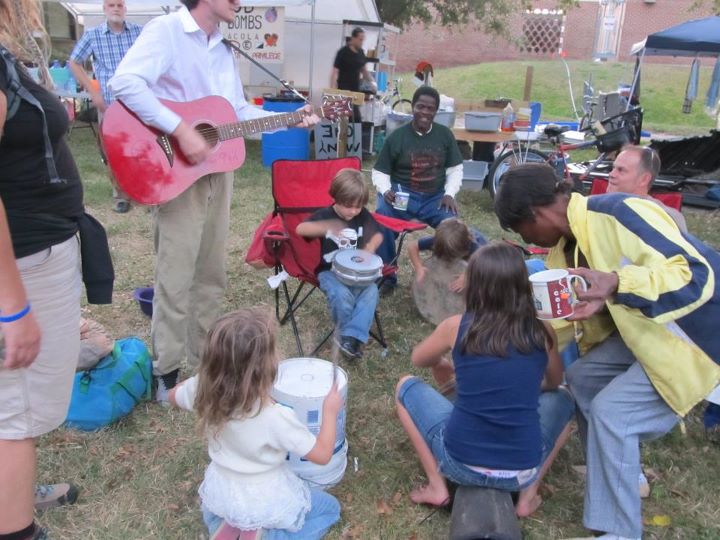By Kezia Kamenetz
In my mind the occupations, more than anything else, are living breathing experiments in organizing community based on anarchistic principles, the scale of which has not been seen in America in decades, if ever. I think this is the most exciting thing to happen to anarchism in my lifetime. This conviction begs the question: where are all the anarchists?
At the occupation I have seen those who have dedicated their lives to organizing and activism of all radical stripes leave in frustration. It is one thing to meet with those who already share your analysis and create non-hierarchical organizations with them. It is quite another to seek consensus with those who do not share your views. That is when the true test of ideals occurs: when the desire to create a world in the image of anarchist analysis clashes with the desire to create a world where no unjustified power is asserted and everyone is given the same freedoms we would want for ourselves.
 This isn’t meant to blame. The practice of anarchism is extremely hard work. It is made even harder when you have so much knowledge about what is wrong with this world, when you have so much passion about the tactics that should be used, when you have so much conviction about the ways we should structure a different community, as so many radicals and anarchists do. The more you know, the harder it is to relate to those who don’t, let alone break bread and make compromises with them.
This isn’t meant to blame. The practice of anarchism is extremely hard work. It is made even harder when you have so much knowledge about what is wrong with this world, when you have so much passion about the tactics that should be used, when you have so much conviction about the ways we should structure a different community, as so many radicals and anarchists do. The more you know, the harder it is to relate to those who don’t, let alone break bread and make compromises with them.
But let’s be clear: anarchists cannot create the massive change they seek by themselves. With the occupations, there is an opportunity for anarchist organizing principles to reach the masses. I believe anarchists need to be, more than anything else, models of relationship and organizing that is non-hierarchical and consensus-based. But how?
If I’ve learned anything at the occupation, it’s that the analysis and theories of anarchism have little if anything to do with its practice. A person can have as radical an analysis as anyone: that private property is theft, that our devotion to patriarchy continues to oppress half of the population, that those in power incite racism by oppressing and exploiting people of color, or simply that the application of unjustified power is the ultimate locus of everything that is wrong in our world. But how does one put this analysis in practice? What is unjustified power and how can it be prevented from asserting itself– and how can we prevent individuals from submitting to it?
This is a question with endless answers, so I’ll start simply with the experience I’ve had so far in trying to facilitate General Assemblies at Occupy New Orleans. The first time I saw video of the General Assemblies I was mesmerized. Finally, a clear image of anarchistic political organization! I was convinced this would result in the utopia I have always dreamed of (more accurately, the utopia as imagined by Ursula LeGuin’s “The Dispossessed”). When Occupy NOLA began, I immediately applied myself to the facilitation of the GAs. To me, discovering and perfecting this process was an important aspect of the movement and I wanted to contribute.
When I set off to help facilitate, I didn’t really do much research. A man from the New York occupation was around and had been doing facilitation up there. I immediately deferred to him. This was one of my first mistakes, and thus one of the first lessons I learned. Even when someone knows more, or has had more experience, it does not mean that he should be unquestioned. If we do not want unjustified power asserted over us, we have to be careful when we eschew responsibility. When we do not take responsibility we give away our freedom and become vulnerable to power, even when it is not being aggressively asserted. Perhaps if Occupy Nola had not had the authority of someone from New York, it would have started from a much less authoritative position as it began the assemblies. If everyone had felt truly engaged in the process from the beginning, it could have eased the pain of creating consensus within the body.
As General Assemblies continued, the facilitation group began the process of creating our process. This is where I made another mistake. As a very vocal member of the facilitation committee, I pushed for having assemblies be as close to how assemblies were supposedly operating in other cities around the country, thinking people would eventually understand, even though day after day we were alienating more and more members of our assembly as we stalled out on even basic issues. I did not respond to the needs of the community but instead, because of my conviction of how the meetings should go, and my belief that the process was going to work, I asserted my conviction over others. I was not patient with those in the occupation, I did not try hard enough to reach them where they were. We did not start as inclusively as we could have, and we have suffered for it.
Let me be clear: I know deeply that one of the most wonderful/terrible things about a truly decentralized organization is that we can only feel so much responsibility when things go poorly, or wonderfully. I don’t blame myself for how things have progressed. I’m just trying to analyze how I unjustly asserted myself.
The lesson I learned is that even a strong conviction about something can be enough to create a dynamic of unjustified power in a group. Special knowledge can do this even moreso. If you have either, you should be in a constant state of check, ready to defer to others at any moment, even if they have neither. We cannot assert our power over others because of their ignorance. Even if this ignorance appears willful, we must keep trying to bridge the gaps. As individuals and people living in groups we have very little experience when authority is not asserted. It is a hole that we seek to fill, because without leaders the responsibility rests solely on us. This is the underbelly of being given the amount of freedom available in a space like the occupation– it is a great responsibility. We have to empower ourselves to speak our truth and live our bliss while being ever vigilant as to when those acts are preventing others from the same.
And so, the General Assemblies go on. Brave souls stick it out night after night in the face of pretty intense danger. Dinner gets served. Discussions reach new highs and lows. The pace is slow, but that’s how we know we are in New Orleans. I can’t venture to guess what is going to happen, which is certainly the most exciting part. But perhaps the biggest lesson I have learned is that these occupations are extremely difficult to stop. Even those who walked out in frustration trickle back. At times I feel that the occupation is impossible, that I have to leave, that I could do it better myself or with the help of those with whom I share close bonds, but yet I cannot not give up on the occupation, for the same reason I can not give up on anarchism. It has taught me too much, and given me too much hope. Even though I was born and bred in systems of unjust power– economic, political and social– I have faith that as individuals and groups we can break those patterns: that in the end, these systems are just tools we use to assuage our egos or seek control when we feel fear, and through hard work and careful practice, we can find real ways to break them down.
Anarchism as a theory is not the same as anarchism as a practice, but they are based in the same values: that we should love and trust one another simply because we are human, and that no one will know true freedom until everyone is liberated and empowered in a precisely equal way. This is our challenge and our only hope. Are we ready to rise to the occasion? Hope to see y’all at the occupation…
Share
This is a good article and a great introspective. I believe in the occupation and anarchistic ideals, so I didnt need convincing when I showed up. But when I went to the assembly I felt like I was in kindergarten. The peoples mic, to me was obviously absurd, considering the assembly consisted of no more than 30-40 people all easily within earshot. Topics of discussion that could have been addressed in a matter of minutes dragged on for 15- 20 minutes at times. I offered to make a stencil for spraypainting tees and what met with wiggly fingers in the air. But then when asked when I could bring it by, i responded that it would have to wait till after work the next day, and was met by audible groans from the assembly. After which another 5 minutes was wasted as I was reprimanded for bringing up my personal responsibilities during the assembly. Needless to say I walked away and only returned briefly to drop off the stencil.
But still Im curious as to the status of Occupy NOLA, and whether there is a new meeting ground?